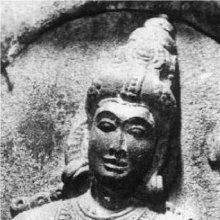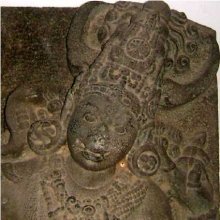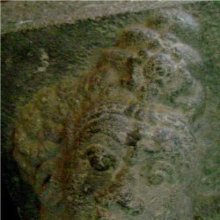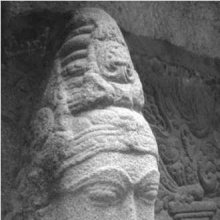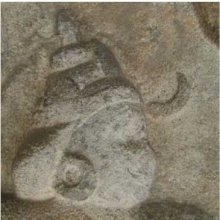Karaṇda, Karaṇḍa, Kāraṇḍa, Karamda: 18 definitions
Introduction:
Karaṇda means something in Hinduism, Sanskrit, Buddhism, Pali, the history of ancient India, Marathi, Jainism, Prakrit, biology. If you want to know the exact meaning, history, etymology or English translation of this term then check out the descriptions on this page. Add your comment or reference to a book if you want to contribute to this summary article.
Images (photo gallery)
(+10 more images available)
In Hinduism
Purana and Itihasa (epic history)
Source: archive.org: Shiva Purana - English TranslationKāraṇḍa (कारण्ड) refers to “castor (oil)”, according to the Śivapurāṇa 2.3.44 (“Menā regains consciousness”).—Accordingly, as Menā said to her daughter (Pārvatī): “[...] Throwing away cooked rice you have eaten the husk. Spilling away the clarified butter you have eagerly swallowed castor oil (kāraṇḍa—tailaṃ kāraṇḍaṃ). Setting the lion aside a jackal has been served by you. Without listening to the lore of Supreme Brahman you have heard base ballads. O daughter, casting off the holy sacrificial ashes at home you have taken the inauspicious ashes from the funeral pyre. [...]”.

The Purana (पुराण, purāṇas) refers to Sanskrit literature preserving ancient India’s vast cultural history, including historical legends, religious ceremonies, various arts and sciences. The eighteen mahapuranas total over 400,000 shlokas (metrical couplets) and date to at least several centuries BCE.
India history and geography
Source: archive.org: Glossary of Sinhalese Folk Terms appearing in the Service Tenure RegisterKaranda:—A tree, the twigs of which are in general use amongst Buddhist priests by way of tooth brushes. The village of Tittawelgoda has to supply annually 2000 of these tooth-brushes to the Dambulla monastery.

The history of India traces the identification of countries, villages, towns and other regions of India, as well as mythology, zoology, royal dynasties, rulers, tribes, local festivities and traditions and regional languages. Ancient India enjoyed religious freedom and encourages the path of Dharma, a concept common to Buddhism, Hinduism, and Jainism.
Biology (plants and animals)
Source: Wisdom Library: Local Names of Plants and DrugsKaranda [ಕರಂಡ] in the Kannada language is the name of a plant identified with Carissa carandas L. from the Apocynaceae (Oleander) family having the following synonyms: Arduina carandas, Echites spinosus, Jasminonerium carandas. For the possible medicinal usage of karanda, you can check this page for potential sources and references, although be aware that any some or none of the side-effects may not be mentioned here, wether they be harmful or beneficial to health.
Source: Google Books: CRC World Dictionary (Regional names)1) Karanda in English is the name of a plant defined with Carissa carandas in various botanical sources. This page contains potential references in Ayurveda, modern medicine, and other folk traditions or local practices It has the synonym Damnacanthus esquirolii H. Lév. (among others).
2) Karanda in India is also identified with Carissa opaca.
3) Karanda is also identified with Carissa spinarum It has the synonym Jasminonerium suavissimum (Bedd. ex Hook.f.) Kuntze (etc.).
4) Karanda is also identified with Pongamia pinnata It has the synonym Cajum pinnatum (L.) Kuntze (etc.).
Example references for further research on medicinal uses or toxicity (see latin names for full list):
· Journal of Natural Products
· Indian forester (1921)
· Beskrivelse af Guineeiske planter (1827)
· Mémoires de l’Institut Scientifique de Madagascar, Série B, Biologie Végétale (1949)
· Nat. Prod. Res. (2003)
· Encyclopédie Méthodique, Botanique (1788)
If you are looking for specific details regarding Karanda, for example health benefits, side effects, chemical composition, pregnancy safety, extract dosage, diet and recipes, have a look at these references.

This sections includes definitions from the five kingdoms of living things: Animals, Plants, Fungi, Protists and Monera. It will include both the official binomial nomenclature (scientific names usually in Latin) as well as regional spellings and variants.
Languages of India and abroad
Pali-English dictionary
Source: BuddhaSasana: Concise Pali-English Dictionarykaraṇda : (m.) casket; a small box or receptacle.
Source: Sutta: The Pali Text Society's Pali-English DictionaryKaraṇḍa, (m. nt.) (cp. Sk. karaṇḍa, °ka, °ikā. The Dhātumañjūsā explains k. by “bhājanatthe”) 1. a basket or box of wicker-work Mhvs 31, 98; Dāvs. V, 60; DhA. III, 18;— 2. the cast skin, slough of a serpent D. I, 77 (=DA. I, 222 ahi-kañcuka) cp. Dial. I. 88. (Page 196)

Pali is the language of the Tipiṭaka, which is the sacred canon of Theravāda Buddhism and contains much of the Buddha’s speech. Closeley related to Sanskrit, both languages are used interchangeably between religions.
Marathi-English dictionary
Source: DDSA: The Molesworth Marathi and English Dictionarykaraṇḍa (करंड).—m (S) A little casket. 2 A basket of bamboo wicker-work.
--- OR ---
karaṇḍā (करंडा).—m (karaṇḍa S) A casket (of metal, wood, ivory). 2 A covered basket of bamboo. 3 C A clump, chump, or block of wood. 4 The stock or fixed portion of the staff of the large leaf-covered summerhead or umbrella.
--- OR ---
karanda (करंद).—f (See karavanda) Corinda-tree, and n Its fruit.
--- OR ---
karandā (करंदा).—m (Or kārandā) The Corinda tree or its fruit.
--- OR ---
karāṇḍā (करांडा).—m C A cylindrical piece as sawn or chopped off the trunk or a bough of a tree; a clump, chump, or block.
--- OR ---
karāndā (करांदा).—m (karamardda S) Corinda tree or fruit, Carissa Carondas. 2 The name of a creeper having an esculent fruit and root. Disting. into gōḍa karāndā & kaḍū karāndā Sweet (cultivated or esculent) karāndā and Bitter (wild and inesculent) karāndā.
--- OR ---
kāraṇḍā (कारंडा).—m A chump or block. See karaṇḍā.
--- OR ---
kārandā (कारंदा).—m (Or kārindā Corinda tree or its fruit. 2 A certain creeper bearing an esculent fruit and root.
Source: DDSA: The Aryabhusan school dictionary, Marathi-Englishkaraṇḍā (करंडा).—m A casket, a covered basket of bamboo.
--- OR ---
karanda (करंद).—f Corinda-tree, and n Its fruit.
Marathi is an Indo-European language having over 70 million native speakers people in (predominantly) Maharashtra India. Marathi, like many other Indo-Aryan languages, evolved from early forms of Prakrit, which itself is a subset of Sanskrit, one of the most ancient languages of the world.
Sanskrit dictionary
Source: DDSA: The practical Sanskrit-English dictionaryKaraṇḍa (करण्ड).—[kṛ-aṇḍan Uṇādi-sūtra 1.126]
1) A small box or basket (of bamboo); करण्डपीडिततनोः भोगिनः (karaṇḍapīḍitatanoḥ bhoginaḥ) Bhartṛhari 2.84; सर्वमायाकरण्डम् (sarvamāyākaraṇḍam) 1.77.
2) A bee-hive.
3) A sword.
4) A sort of duck (kāraṇḍava).
5) Liver.
6) A crest; cf. करण्डो मुकुटे पात्रे (karaṇḍo mukuṭe pātre) Nm.
Derivable forms: karaṇḍaḥ (करण्डः).
--- OR ---
Kāraṇḍa (कारण्ड).—A sort of duck; Rām.7.31.21. Bhāgavata 8.2.16; तप्तं वारि विहाय तीरनलिनीं कारण्डवः सेवते (taptaṃ vāri vihāya tīranalinīṃ kāraṇḍavaḥ sevate) V.2.23.
Derivable forms: kāraṇḍaḥ (कारण्डः).
See also (synonyms): kāraṇḍava.
Source: Cologne Digital Sanskrit Dictionaries: Shabda-Sagara Sanskrit-English DictionaryKaraṇḍa (करण्ड).—m.
(-ṇḍaḥ) 1. A basket or covered box of bamboo wicker work. 2. A bee-hive, a honey-comb. 3. A sword. 4. A sort of duck. 5. An aquatic weed, (Vallisneria.) E. kṛ to do, aṇḍan Unadi aff.
Source: Cologne Digital Sanskrit Dictionaries: Benfey Sanskrit-English DictionaryKaraṇḍa (करण्ड).—m. and n. (Böhtl. Ind. Spr. 392), A basket or covered box of wicker work, [Bhartṛhari, (ed. Bohlen.)] 2, 82.
Source: Cologne Digital Sanskrit Dictionaries: Cappeller Sanskrit-English DictionaryKaraṇḍa (करण्ड).—[neuter] ṇḍaka [masculine], ṇḍikā [feminine] a basket or box.
Source: Cologne Digital Sanskrit Dictionaries: Monier-Williams Sanskrit-English Dictionary1) Karaṇḍa (करण्ड):—[from kara] a mf(ī, [cf. Lexicographers, esp. such as amarasiṃha, halāyudha, hemacandra, etc.])n. ([Uṇādi-sūtra i, 128]) a basket or covered box of bamboo wicker-work, [Bhāgavata-purāṇa; Bhartṛhari] etc.
2) [v.s. ...] a bee-hive, honey-comb, [cf. Lexicographers, esp. such as amarasiṃha, halāyudha, hemacandra, etc.]
3) [v.s. ...] m. a sword, [cf. Lexicographers, esp. such as amarasiṃha, halāyudha, hemacandra, etc.]
4) [v.s. ...] a sort of duck, [cf. Lexicographers, esp. such as amarasiṃha, halāyudha, hemacandra, etc.]
5) [v.s. ...] a species of plant (= dalāḍhaka), [cf. Lexicographers, esp. such as amarasiṃha, halāyudha, hemacandra, etc.]
6) [v.s. ...] n. a piece of wood, block, [Bhāvaprakāśa]
7) b See p. 254, col. 2.
8) Kāraṇḍa (कारण्ड):—m. a sort of duck, [Rāmāyaṇa vii, 31, 21] (cf. karaṇḍa.)
Source: Cologne Digital Sanskrit Dictionaries: Yates Sanskrit-English DictionaryKaraṇḍa (करण्ड):—(ṇḍaḥ) 1. m. A basket or covered box of bamboo wicker work; bee hive; honey comb; a sword; a duck; Valesneria.
Source: DDSA: Paia-sadda-mahannavo; a comprehensive Prakrit Hindi dictionary (S)Karaṇḍa (करण्ड) in the Sanskrit language is related to the Prakrit words: Karaṃḍa, Karaṃḍaga, Karaṃḍaya.
[Sanskrit to German]
Sanskrit, also spelled संस्कृतम् (saṃskṛtam), is an ancient language of India commonly seen as the grandmother of the Indo-European language family (even English!). Closely allied with Prakrit and Pali, Sanskrit is more exhaustive in both grammar and terms and has the most extensive collection of literature in the world, greatly surpassing its sister-languages Greek and Latin.
Prakrit-English dictionary
Source: DDSA: Paia-sadda-mahannavo; a comprehensive Prakrit Hindi dictionary1) Karaṃḍa (करंड) in the Prakrit language is related to the Sanskrit word: Karaṇḍa.
2) Karaṃḍa (करंड) also relates to the Sanskrit word: Karaṇḍa.
2) Karaṃḍa has the following synonyms: Karaṃḍaga, Karaṃḍaya.
3) Kāraṃḍa (कारंड) also relates to the Sanskrit word: Kāraṇḍaka.
Kāraṃḍa has the following synonyms: Kāraḍaṃga, Kāraṃjava.
Prakrit is an ancient language closely associated with both Pali and Sanskrit. Jain literature is often composed in this language or sub-dialects, such as the Agamas and their commentaries which are written in Ardhamagadhi and Maharashtri Prakrit. The earliest extant texts can be dated to as early as the 4th century BCE although core portions might be older.
Kannada-English dictionary
Source: Alar: Kannada-English corpusKaraṃḍa (ಕರಂಡ):—
1) [noun] a small box or chest, with a lid; a casket.
2) [noun] a basket made of thin splits of bamboo.
3) [noun] the plant Carissa carundas of Apocynaceae family.
4) [noun] its fruit.
5) [noun] (sculpture.) one of the twelve kinds of head-gear.
--- OR ---
Kāraṃḍa (ಕಾರಂಡ):—[noun] any of a large number of relatively small waterfowl with a flat bill, short neck and legs, and webbed feet; a duck.
Kannada is a Dravidian language (as opposed to the Indo-European language family) mainly spoken in the southwestern region of India.
See also (Relevant definitions)
Full-text (+620): Karandava, Karandaka, Karandavyuha, Karandin, Karandem, Magul-karanda, Karamdaya, Karamdaga, Karandas, Karamdavakki, Karamdage, Karamdige, Kadukaranda, Karamdike, Gal-karanda, Godakaranda, Karamde, Karandula, Karandaphalaka, Karamda.
Relevant text
Search found 24 books and stories containing Karaṇda, Karaṇḍa, Kāraṇḍa, Karamda, Karanda, Karaṇḍā, Karandā, Karāṇḍā, Karāndā, Kāraṇḍā, Kārandā, Karaṃḍa, Kāraṃḍa; (plurals include: Karaṇdas, Karaṇḍas, Kāraṇḍas, Karamdas, Karandas, Karaṇḍās, Karandās, Karāṇḍās, Karāndās, Kāraṇḍās, Kārandās, Karaṃḍas, Kāraṃḍas). You can also click to the full overview containing English textual excerpts. Below are direct links for the most relevant articles:
Pallava period (Social and Cultural History) (by S. Krishnamurthy)
Head-dress of Women (a): Karanda-makuta < [Chapter 4 - Material Culture of the People]
Head-dress of Men (Crowns) < [Chapter 4 - Material Culture of the People]
Crowns for Men (b): Karanda-makuta < [Chapter 4 - Material Culture of the People]
Head-Gears in Hindu Art < [March 1937]
A Record of Buddhistic Kingdoms (by Fa-Hien)
Manasara (English translation) (by Prasanna Kumar Acharya)
Chapter 49 - The crowns (mauli) and coronation (abhiṣeka)
Chapter 54 - The altar (śakti-lakṣaṇa)
Chapter 58 - The images of Yakṣas, Vidyādharas, and other mythical beings
Brihad Bhagavatamrita (commentary) (by Śrī Śrīmad Bhaktivedānta Nārāyana Gosvāmī Mahārāja)
Verse 2.1.133 < [Chapter 1 - Vairāgya (renunciation)]
Verse 2.1.134 < [Chapter 1 - Vairāgya (renunciation)]
Later Chola Temples (by S. R. Balasubrahmanyam)
Temples in Nidur < [Chapter II - Temples of Kulottunga I’s Time]
Temples in Melakkadambur < [Chapter II - Temples of Kulottunga I’s Time]
Related products
